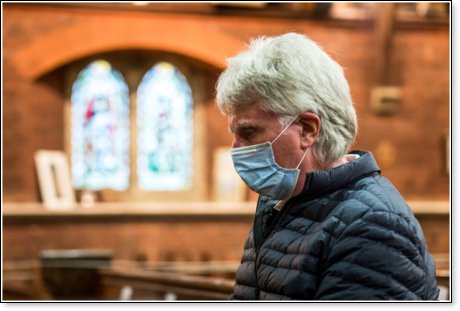
Rev. Mark H. Creech

For the last few months, I've been on the telephone with hundreds of pastors, asking them how their churches are navigating the Coronavirus Crisis. The stories of low attendance are disturbing, despite churches employing health protocols to keep people as safe as possible. Many are saying that their churches are in jeopardy of failing.
Now Christian geneticist and U.S. National Institutes of Health Director, Francis Collins, advises that churches ought to postpone in-person services due to the virus until the summer of 2021, when most Americans have received a vaccine. Collins says churches should either go remote or virtual.
I respectfully dissent!
There's a mental health crisis occurring in conjunction with the pandemic. Drug and alcohol abuse are exceedingly high. Suicides are through the roof. More than ever, the doors of the church should be open, with services provided regularly. People need a place that they can go to find spiritual counsel, comfort, and hope.
Years ago, I heard an old faithful preacher advising a woman who said she could go to church just as well by radio and television as she could by attending church services. He wisely responded, "Lady, going to church via television is about like kissing your boyfriend over the telephone. It just ain't the same."
In one of the great passages of exhortation in the Book of Hebrews, the readers are strongly admonished, "…not neglecting to meet together, as is the habit of some, but encouraging one another, and all the more as you see the Day drawing near" (10:25 RSV).
Just as government coerced lockdowns kill businesses during the pandemic, closed church doors seriously injure churches and their mission. Church attendance for so many is habitual, and getting out of the habit can be devastating to one's spiritual life. Someone put it this way: "We first make our habits, and then our habits make us."
I don't doubt the reality of the virus. I recently spoke at the Memorial Service of a close friend who died of COVID 19. Nevertheless, our government's response and the way many church leaders have acquiesced to closing church doors and canceling services has been beyond the pale. Moreover, too many professing Christians, who could attend church services, are staying at home for fear of catching the virus.
Is this the proper response for a people who should be facing death with the assurance of eternal life?
Think of the early Christians who often met in hiding, knowing they might be put to a torturous death if they were caught meeting together for worship.
And we are afraid of a virus in which ninety-nine percent of the people who get it recover, and less than one percent die from it?
Think of the apostles of Christ, all of which, except John, died horrendous deaths for the practice of their faith. Andrew was crucified on an X-shaped Cross. Matthew was impaled to the earth by spears and then beheaded. Bartholomew was flayed to death by a whip and torn to shreds. Thomas died from a stabbing. Philip was impaled by iron hooks in his ankles and hung upside down to die. James, Jesus' brother, is thought to have been beheaded by King Herod near Palestine. Jude was crucified. Matthias was stoned and then beheaded. Death hung over them every day like a Damocles sword for the practice of their religion.
And we're avoiding church because of a virus from which the overwhelming majority of people recover?
Brian Kingslake, in Out of This World, addresses the question of why going to a church building or a specific gathering place best serves our faith. He eloquently writes:
"The whole subject of the relationship between the externals and the internals of religion is very interesting. Just as the stone walls and locked doors of a church building protect the altar Bible, the Communion vessels and the rich carpets of the sanctuary (and, I may add, the tape recorder and P.A. system) so the externals of religion can protect and preserve the more precious worship of the heart. The fact that we discipline ourselves to attend service in a certain building at a definite hour, and take part in a certain ritual that has evolved during the ages, can help to preserve and protect our spiritual consciousness. To depend entirely on one's spiritual vitality is beyond the capacity of most of us. Structure can get in the way, but without any structure, there is a tendency for our thoughts to dissipate and degenerate into trivia and superficial or sentimental nothingness. We need to get together with our friends from time to time to 'fill our tanks at the filling station,' so to speak, to recharge our flat batteries."

I suggest this can't be effectively done by setting up your laptop, iPad, or smart phone and watching church staff online.
I'm not saying the church is brick and mortar. The church is God's people. I'm not saying the stained glass windows confer the forgiveness of sins or the gift of eternal life. I'm not saying the pipe organ with its exquisite music is what brings the sinner to repentance. It's not the choir singing while gorgeously robed, or the hymns sung by the congregation, or the lighting of candles, or even the powerful message from the pastor that define what it means to be a Christian.
Neither do I mean to say we should throw caution to the wind. What I am saying, however, is that our churches should be open with proper health protocols, including taking temperatures, wearing masks, hand washing stations, etc. And if your health is not already seriously compromised by your age or a serious underlying health condition, you need to be in church!
Yes, you need to be in church, even during this pandemic.
© Rev. Mark H. CreechThe views expressed by RenewAmerica columnists are their own and do not necessarily reflect the position of RenewAmerica or its affiliates.




















